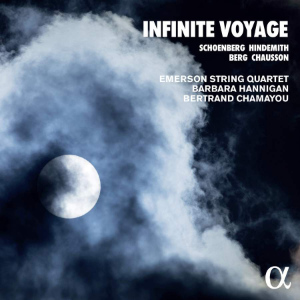
Infinite Voyage
Paul Hindemith (1895-1963)
Melancholie Op13
Alban Berg (1885-1935)
String Quartet Op3
Ernest Chausson (1855-1899)
Chanson perpétuelle Op37
Arnold Schoenberg (1874-1951)
String Quartet No.2 in F sharp minor Op10
Emerson String Quartet
Barbara Hannigan (soprano)
Bertrand Chamayou (piano) (Chausson)
rec. 2022, Muziekcentrum van de Omroep, Hilvershum, The Netherlands (Hindemith, Chausson, Schoenberg); Staller Center for the Arts, Stony Brook University, USA (Berg)
Reviewed as a digital download from a press preview
Alpha Classics 1000 [72]
This recording might be subtitled: what musicians really want to record rather than what they think they have to record. After nearly five decades, the Emerson Quartet are calling it quits and they haven’t gone out with crowd pleasers like Beethoven or Mozart. In some ways this is typical of them. They have always retained an enthusiasm for the music of the Second Viennese School. A cursory glance at their discography tells another story – there is a lot of Schubert and Brahms occasionally leavened with more spiky repertoire. I imagine the economics of the classical recording industry play a part in this and I doubt a disc of Schoenberg, Hindemith and Berg sells that well even with the illustrious Emerson name on the label. So, this new, final recording has a feel of ‘we wanted to record what we like’ about it.
Another oddity is that music that is now over a century old is still seen as unapproachably modern. I doubt Schoenberg’s epochal second Quartet is ever going to be popular but it is strange that it still provokes extreme reactions when other scandalous scores like Le Sacre now feel cosily familiar. Personally, I see it as a testament to the genuine radicalism of Schoenberg’s genius. Whilst to some extent Berg is still tarred with the same brush, works like his Violin Concerto have taken great strides out of the serialism ghetto into the mainstream. Is his early Op3 Quartet still viewed as the unacceptable face of modernism? If so, I hope a performance as impassioned as this one goes a long way to rectifying this perception.
Indeed, my fond hope is that the star name of the quartet draws listeners to these pieces who would normally give them a swerve. The curious listener could hardly ask for a better introduction. Even the Hindemith and the Chausson which both left me a little unimpressed are given model advocacy. That advocacy from the Emersons and starry guests seems especially odd in a score as bland as Hindemith’s war haunted song cycle. Like much of his music there is nothing wrong with it and therein lies the problem. Craftsmanship can only go so far without depths or even risks. It is striking that for a composer known as a string virtuoso that the quartet writing is so conventional.
The Chausson is scarcely more interesting with its very average slice of lukewarm post Wagner feeling like a very odd fit for the rest of the programme. But if a little indulgence can’t be allowed at a retirement do when can it?
It is a testament to the quality of the Berg and Schoenberg that this disc left me mightily impressed despite these caveats. Yes, the Emersons didn’t quite dispel my image of them as slick and deluxe but, as with Karajan’s famous box set of music from the Second Viennese School showed, this is music that thrives on being given the glam treatment once in a while.
Hannigan is her usual peerless self if singing of such rare distinction can ever be seen as usual. I wish that the string players had matched her eerie, transported tone in the famous final movement of the Schoenberg but that is to nitpick. Throughout their playing of both this and the Berg is warm blooded not beamed from another planet no matter what Stefan George’s words as set by Schoenberg say.
All that remains is to wish the Emerson Quartet a long, healthy and fruitful retirement and to say, in the spirit of this recording’s title, Bon voyage!
David McDade
Help us financially by purchasing from





















